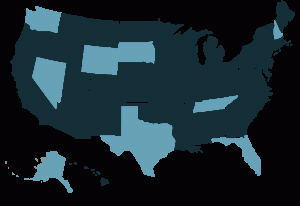One of the key ways of controlling state and local tax burdens, according to this map from the Tax Foundation, is to not have an income tax.
But that’s not too surprising. States have just a couple of ways of generating significant tax revenue, so it stands to reason that states without an income tax would have relatively low tax burdens.
The more important question is whether this approach leads to better economic performance. The evidence is pretty clear that zero-income-tax states grow faster and create more jobs.
I’ve already shared some important research on this topic, including this review of research in the Cato Journal by Richard Rahn, as well as this summary of similar analysis in Rich States, Poor States by Art Laffer and Steve Moore.
There’s even some evidence that people in low-tax states are happier than those in high-tax states, though I’m not sure that I trust that kind of subjective research since there’s also a study showing people are happier in high-tax nations. (at least, unlike Brazil, nobody in the U.S. is talking about making happiness a responsibility of government).
Let’s return to the more substantive topic of taxes and economic performance. There’s a column examining this issue in today’s Wall Street Journal. Authored by two experts from the Kansas Policy Institute, it finds that states with no income tax have a lower burden of government spending.
In the midst of a dismal recovery where every job counts, one fact stands out: States that tax less achieve better economic performance. …The secret to having low taxes is controlling spending, and that’s exactly what low-tax-burden states do. States with an income tax spent 42% more per resident in 2011 than the nine states without an income tax. …Every state has public schools, social-service programs, prisons, etc. Some just find ways to provide essentially the same basket of services at lower prices.
They also reveal that lower taxes and lower spending translate into more growth and prosperity.
States that allow taxpayers and employers to keep more of their earnings are reaping the benefits. States without an income tax have significantly better growth in private sector GDP (59% versus 42%) over the last 10 years. They increased the number of jobs by 4.9% while jobs in the rest of the states declined by 2.6%. States without an income tax gained population (+5.5%) from domestic migration (U.S. residents moving in and out of states) while all other states as a whole lost 1.3% of population between 2000 and 2009.
The migration data is particularly powerful, and it’s one of the reasons why California’s class-warfare tax policy is so suicidal and why Texas is growing so rapidly. As I’ve said many times before, tax competition is a critical way of disciplining profligate governments and rewarding jurisdictions with more responsible fiscal policy.
Last but not least, if you want a powerful example of why income taxes are economic poison, read this research showing how Connecticut’s economic performance dropped after imposing a state income tax about 20 years ago.

